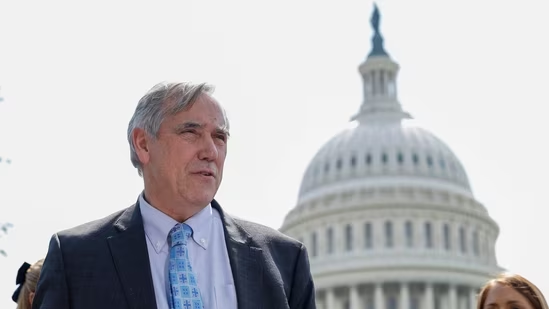Arunachal Pradesh integral part of India: US Senate Foreign Relations Committee
The United States Senate Foreign Relations Committee (SFRC) has approved, on a bipartisan basis, a resolution that reaffirms Arunachal Pradesh’s status as an integral part of India. The SFRC approval clears the way for the resolution to be introduced on the floor of the Senate and its possible adoption by the full chamber.

The resolution was introduced by Oregon’s Jeff Merkley and Tennessee’s Bill Haggerty, and co-sponsored by Texas’s John Cornyn, Virginia’s Tim Kaine, and Maryland’s Chris Van Hollen.
The resolution, as HT first reported in February when it was introduced, lauds the Indian government for the steps it has taken to “defend itself” against the “aggression and security threats” from China. It supports India’s defence modernisation and diversification; applauds India’s development efforts in Arunachal Pradesh, including the steps taken to improve border infrastructure; and commits to deepening US assistance in the region including through its aid agencies. Additionally, it encourages like-minded partners to bolster their own respective assistance to Arunachal Pradesh and expresses strong support for the US-India bilateral partnership, including the initiative on critical and emerging technologies (ICET).
The SFRC approval of the resolution is one more sign that the Senate is emerging as a strong institutional source of support for India, including by advocating deeper defence and security ties and enhancing high-level engagement with the Indian political leadership. This is expected to help in the future when the US executive seeks India-specific exemptions from the US Congress across sensitive defence and technology domains to deepen bilateral ties.
The resolution and its importance
To be sure, successive US administrations have, since 1962, recognised Arunachal as a part of India. But a formal legislative stamp on the recognition adds to the legitimacy of the Indian position in the wake of increased confrontation with China, which continues to reject the Indian claim. It is the first detailed resolution of its kind in the American legislature that not just condemns China but explicitly supports the actions India has taken to counter China, and has the support of political actors from the progressive end of the Democratic Party to the conservative end of the Republican Party.
In a statement after the SFRC approval, Merkley, who is also the co-chair of the Congressional executive commission on China, said, “Committee passage of this resolution affirms that the US views the Indian state of Arunachal Pradesh as part of the Republic of India—not the People’s Republic of China (PRC) — and commits the U.S. to deepening support and assistance to the region, alongside like-minded international partners.” He added that American values “supporting freedom and a rules-based order must be at the center of all of our actions and relationships” around the world, especially as PRC pushed an “alternative vision”.
Haggerty, who has also served as the American ambassador to Japan and is an important voice on Indo-Pacific issues, said that he was delighted to co-lead the resolution reaffirming India’s territorial integrity and pushing back against China’s “provocations”.
“At a time when China continues to pose grave and gathering threats to the Free and Open Indo-Pacific, it’s critical for the US to stand shoulder-to-shoulder with our strategic partners in the region — especially India and other Quad countries — and push back against the CCP (Chinese Communist Party)’s broader strategy of territorial aggrandizement that it has pursued in the South and East China Seas, the Himalayas, and the southern Pacific,” Haggerty said.
Cornyn, who is also the co-chair of the Senate India caucus, said that as tensions escalate between India and China over the border, the US must stand strong in its support for democracy and a free and open Indo-Pacific, and urged his colleagues in the Senate to pass the resolution without delay.
The SFRC is led by Bob Menendez, a Democratic Senator from New Jersey, and the committee’s ranking member is James Risch, a Republican from Idaho. Both are hugely influential in foreign policy-making in the US, and their support for India’s position is seen as important enablers for future cooperation.
The Senate rises as India’s friend
As a co-equal branch of the US government, the Congress has traditionally been important in shaping foreign policy. On Capitol Hill, just this year, the US Senate’s growing support for India is reflected in a range of actions.
Earlier this week, the Senate Armed Services Committee, in its version of the National Defense Autorization Act, directed Pentagon to deepen defence cooperation with India in a range of areas including artificial intelligence, undersea domain awareness, air and combat support, munitions, mobility, joint operations, and asked the Secretary of Defense to explore the possibility of Indian companies bidding for contracts for repair of US defence equipment located outside America.
While the House Speaker Kevin McCarthy played a key role in inviting Prime Minister Narendra Modi to address the joint meeting of the US Congress during his state visit, the formal invitation letter was also signed by both the Senate majority leader, Chuck Schumer, a New York Democrat, and Senate minority leader Mitch McConnell, a Kentucky Republican.
In the run-up to Modi’s visit, SFRC chair Menendez and co-chairs of the Senate India caucus, Mark Warner and Cornyn, had also introduced a resolution celebrating India-US ties. The resolution recognised the US-India global strategic partnership as “critical for regional and global prosperity”, hailed India’s participation in Quad and the Indo-Pacific Economic Framework and its presidency of G20, supported ICET, and lauded the role of the Indian diaspora. It also supported deepening commercial, defence, investment, and people-to-people ties.
In a rare foreign visit, the Senate majority leader, Schumer, had also led the most powerful Congressional delegation to ever visit India earlier this year. The delegation had met Modi.
Disclaimer: The copyright of this article belongs to the original author. Reposting this article is solely for the purpose of information dissemination and does not constitute any investment advice. If there is any infringement, please contact us immediately. We will make corrections or deletions as necessary. Thank you.
Title:Arunachal Pradesh integral part of India: US Senate Foreign Relations Committee
Url:https://www.investsfocus.com









